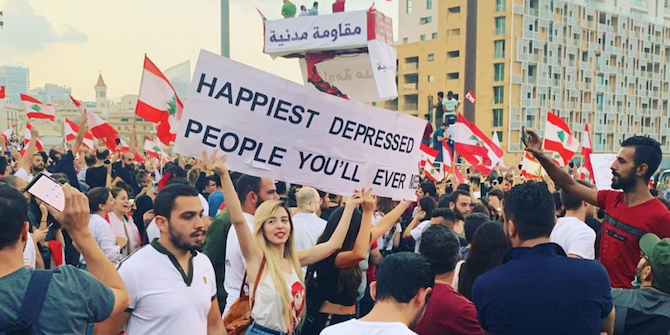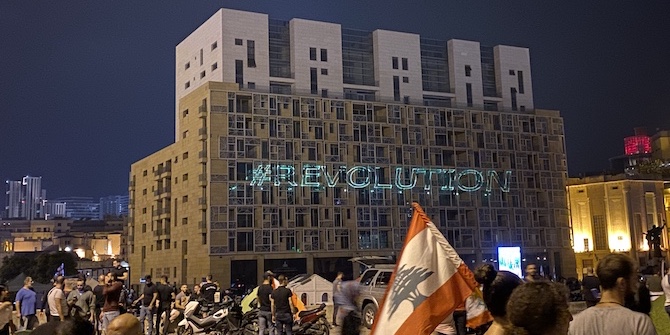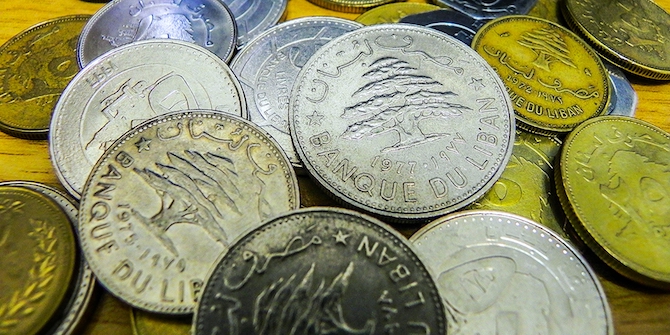by Laetitia Kurban

‘The happiest depressed people you’ll ever meet’: so the Lebanese population have been branded during four months of ongoing protests and revolts. Known for their joie de vivre and resilience throughout tremendous economic and political strife, the Lebanese are hopeful in their fight for a country devoid of sectarianism and corrupt governance.
Nevertheless, beneath this façade of optimism lies a severe undertone of despair. During the last week of November 2019, reports indicated that four people committed suicide and there were two other attempts, exposing the ominous reality of the hardships people face.
Though the media has publicised the recent spate of suicides, going all the way back to George Zreik’s self-immolation in February 2019, this epidemic is part of a larger, deep-rooted problem that has silently swept through the country for years. In fact, during the years 2011–14, the suicide rate increased by 30 percent. Furthermore, suicide rates have increased year-on-year since 2016. That year, suicide was reported to be the cause of 128 deaths in Lebanon, rising to 147 in 2017 and a peak of 200 in 2018.
The World Health Organization (WHO) suggests that since suicide is considered a taboo in the Middle East, it is likely to be under-reported, meaning the actual figures could be higher. WHO’s Preventing Suicide Global Imperative explains that ‘war and civil conflict can increase the risk of suicide because of the destructive impacts they have on social well-being, health, housing, employment and financial security.’ It also highlights that discrimination against sub-groups within a given society is also a risk factor, an issue Lebanon suffers from immensely due to its complex sectarian divide.
Observing the rise in suicide death tolls within post-war Lebanon since 2011 could raise speculation as to whether there is a direct correlation between the country’s deteriorating state and its citizens’ mental health.
The start of the Syrian war in 2011 had devastating effects on Lebanon’s economy. It stopped all kinds of trade through the Syrian/Lebanese border, massively affected tourism, and created an inflow of an estimated 1.5 million refugees into Lebanese territory, resulting in the slowing of both foreign investment and capital injections from the diaspora community.
According to the World Bank, before the Syrian war, one million people in Lebanon suffered from poverty. As a result of the refugee crisis created by the war, an additional 200,000 have fallen below the poverty line while another estimated 300,000 have become unemployed.
The economic and political instability within the region led to a lack of confidence in the Lebanese economy, of which one of the first signs was the weakening of the country’s dollar supply. To top that, a valuation from the World Bank estimates that the refugee crisis cost Lebanon $1.1 billion between 2012–14, as the country’s political and economic wellbeing was already fragile.
Meanwhile, 2011 saw 101 suicides, which increased to 108 in 2012, 111 in 2013, and 143 in 2014. No studies have been conducted to prove a correlation between the increase in suicides and Lebanon’s stuttering economy, however, taking a closer look at studies that have been carried out in similar cases such as the rise in suicide during the Greek economic crisis which was confirmed to be related to Greece’s financial instability by the 2018 Report of the Commissioner for Human Rights of the Council of Europe, we can see that there is a very likely chance that a country’s economic state can affect its citizens’ mental stability. According to the WHO, hopelessness about the future and thoughts about not seeing things improving or getting better can lead to depression and be a driver for suicide. The WHO also lists the consequences of economic recessions – including financial instability and job losses – as major risks for suicide. According to Al-Jazeera, shortages of US dollars have resulted in businesses shutting down and increased unemployment in recent months.
265 restaurants have closed in 2019 and it was projected that this number would reach more than 450 by the start of 2020 as like owners of many other businesses, restaurant owners can no longer import supplies. Throughout all industries across the country, many people have been let go from their jobs while others are have been asked to work part time for much reduced salaries.
In 2017, Lebanon’s unemployment rate reached 25 percent, with youth making up 37 percent of this figure. According to the previous Labor Minister, Mohammad Kabbara, ‘approximately 30,000-35,000 young people … graduate from university every year and only 5,000 jobs are offered annually, which leaves some 30,000 without jobs.’ The Gulf region used to be a place of refuge for the Lebanese labour force, but with the recent decline in oil prices, this market is no longer as viable an option as in the past. This again decreases the inflow of expat reserves into the country. Another factor affecting the labour market is the fact that refugee labour has become a more favourable option for employers over the past few years as it is cheaper than hiring locals.
Numerous factors play into Lebanon’s financial crisis and increasing unemployment rate, but the result is that many families struggle to gain access to basic amenities such as food, shelter and education. According to Embrace, Lebanon’s most proactive mental health NGO which has been a literal life-line to many throughout this time, such levels of stress can lead to suicide in those who already suffer from poor mental health. The ongoing economic and political unrest within the region could have serious repercussions on the Lebanese psychological well-being.
Lebanese bank Blominvest’s research blog states that Lebanon’s average inflation rate reached 3.16% by February 2019. The cost of water, electricity and gas, which previously made up 28.4% of Lebanon’s consumer price index (CPI), rose ‘by 3.15% year-on-year in the first two months of 2019’. To top that, those who can afford it are still paying expensive prices for generators to have 24-hour access to electricity, since the EDL is still unable to provide this despite increased prices. Furthermore, food prices increased by 7.10% year-on-year within the same timeframe.
Lebanon also suffers from regressive taxation in which all citizens are equally taxed by the government regardless of their income or financial status, which negatively impacts poorer communities who are already struggling with inflation and limited growth opportunities.
The absence of mental health support is a detriment to societies who are not well-versed on its effects. A wider education on the topic may help prevent suicidal behaviour and avoid the spread of suicide contagion, which CNN Health defines as the suicide of one person in a society instigating an outburst of suicidal behaviour in others who were already prone to it. As this is the current case in Lebanon, it is crucial to start openly tackling such issues and breaking taboos. With no reliable government to provide support, Lebanese people struggle against the idea of an unknown tomorrow. Mental health awareness and an understanding of its influence on one’s well-being is a crucial coping mechanism in the face of such adversity.







Thank you it is a very interesting article